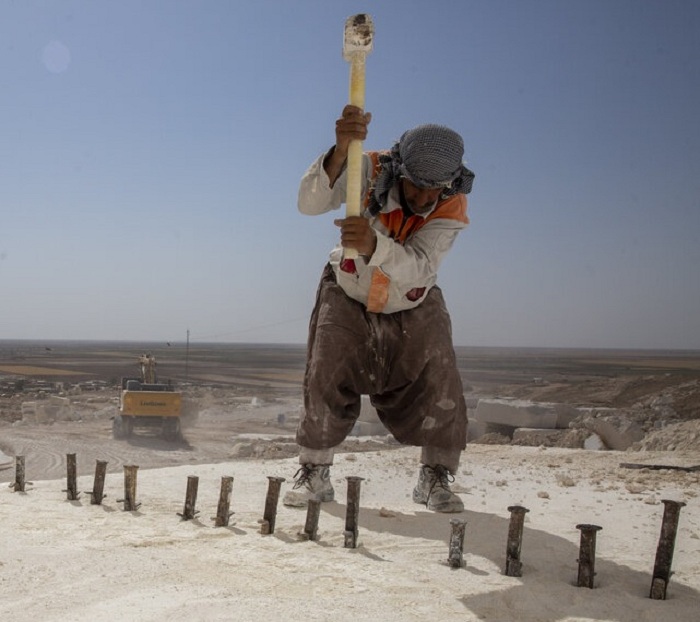Dark and bright A century of work and employment in Iran

The narrative of a century of work and employment in Iran has dark and light points that ignoring its experiences will lead to the repetition of past mistakes.
According to the International Iranian Stone Exhibition, reviewing Iran's 100-year experience in the field of production, work and employment, there are many lessons that provide the ability to reflect on our experiences and will help us better plan the future situation.
The narrative of a century of work and employment in Iran has dark and light points that ignoring its experiences leads to the repetition of past mistakes. In this article, the dark points of this hundred years are discussed and we will narrate the lights in other writings.
First, a hundred-year-old narrative shows that "oil has robbed people of us." Oil can be considered the main factor in the separation of government and people (labor and production forces) in Iran. The disregard for labor because of its reliance on "oil sales," which began before the revolution, continued after the revolution.
Rather than worrying about the independence of the country's economy from oil sales, some governments have taken pride in selling oil under the most severe sanctions, and some have spoken of bringing oil money to the table rather than taking oil out of the economy. While the main issue has been the focus on domestic capacity and the independence of oil revenues.
Economic growth in post-war states is directly related to oil sales, and the difference is that one government with $ 4 billion in oil sales generated one percent economic growth and the other with $ 67 billion. The basic assessment, however, is how much governments have grown by relying on domestic productive forces.
Security, the main platform for the prosperity of production and employment: The beginning of 1300 is the place where twenty-three days have passed since the British-backed coup d'etat on March 24, 2012 by Reza Khan and Seyyed Zia Tabatabai, and the country is still grappling with the crises of World War I. Iran declared neutrality in the war, but despite this neutrality, it became the scene of clashes between Russian, Ottoman and British forces.
This war had a direct and destructive effect on the Iranian economy. Conflicting armies confiscated crops, livestock, and livestock themselves, the irrigation network was destroyed, peasants were forcibly forced to build roads and other military forced labor, and villages were depopulated; Iran did not return to pre-war agricultural production until 1304.
This happened again in the late 1910s, and while Iran had declared neutrality in World War II, the Allies invaded Iran and targeted key sectors of the economy (agriculture, industry, services, foreign trade, government budget, and living standards). The effect of the occupation was severely damaged.
In the latest incident, Iran again inadvertently went to war with Saddam, and its economic infrastructure was challenged for years; Thus, the conflict in the three unwanted wars challenged the main bases of production and employment in Iran.
Forced organization of the productive forces is one of the obstacles to the prosperity of work and employment: "Shepherding and nomadism" and "agriculture" have been the two main aspects of production in the Iranian economy. The first put Reza Khan on the verge of extinction under the pretext of civilizing with the policy of Takht-e Qapoo, and the second, Mohammad Reza, was plunged into the abyss of destruction by promising to enter a great civilization and land reform policies.
The first and second Pahlavis, in their opinion, had found the way to development and, regardless of the historical, indigenous and cultural structures of the productive forces of that period, sought to monopolize the tribes and lead farmers to industrial production, and this factor led to stagnation. Became domestic production. However, according to the history after the fall of Reza Shah, with the removal of the pressure of his repression from the tribal population of the country, unlike other areas, they faced a relative growth during and after World War II.
Value transformation of the meaning of work: The culture of work and employment in society is strongly influenced by the policies of governments. Although Iranians have always proved in practice throughout history that they have been hardworking and diligent, but throughout history, the meaning of work has changed and today earning a living with "sweat of the forehead and chin" has been marginalized and "earning without Work is considered a value.
The implementation of neoliberal policies since the early 1970s has had a major impact on this process, and the sale of books with a 50 percent discount entitled "How to Get Rich overnight" has also intensified the value transformation of work.
* Farshad Karami, researcher in the field of labor and employment










